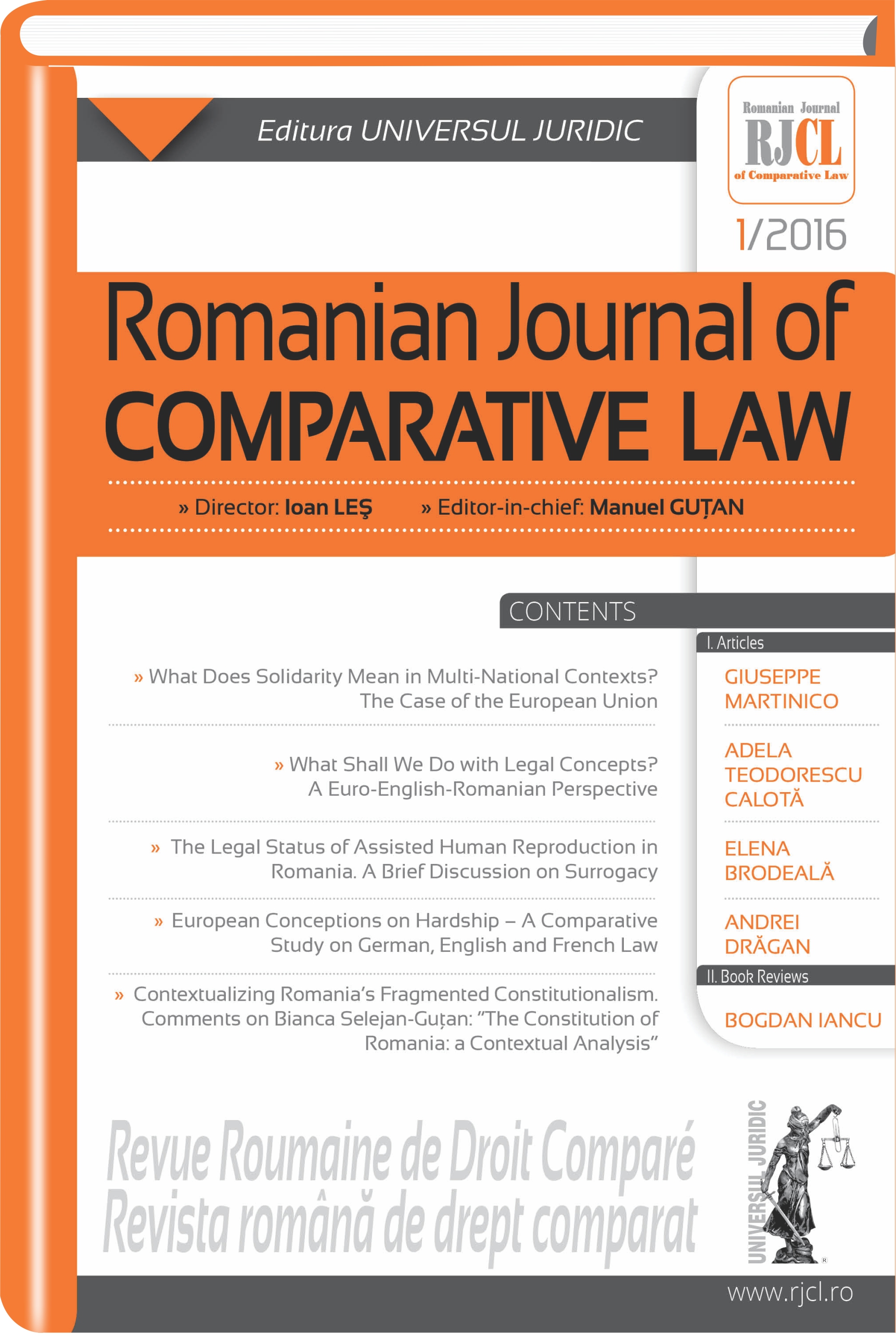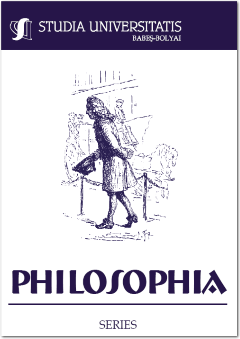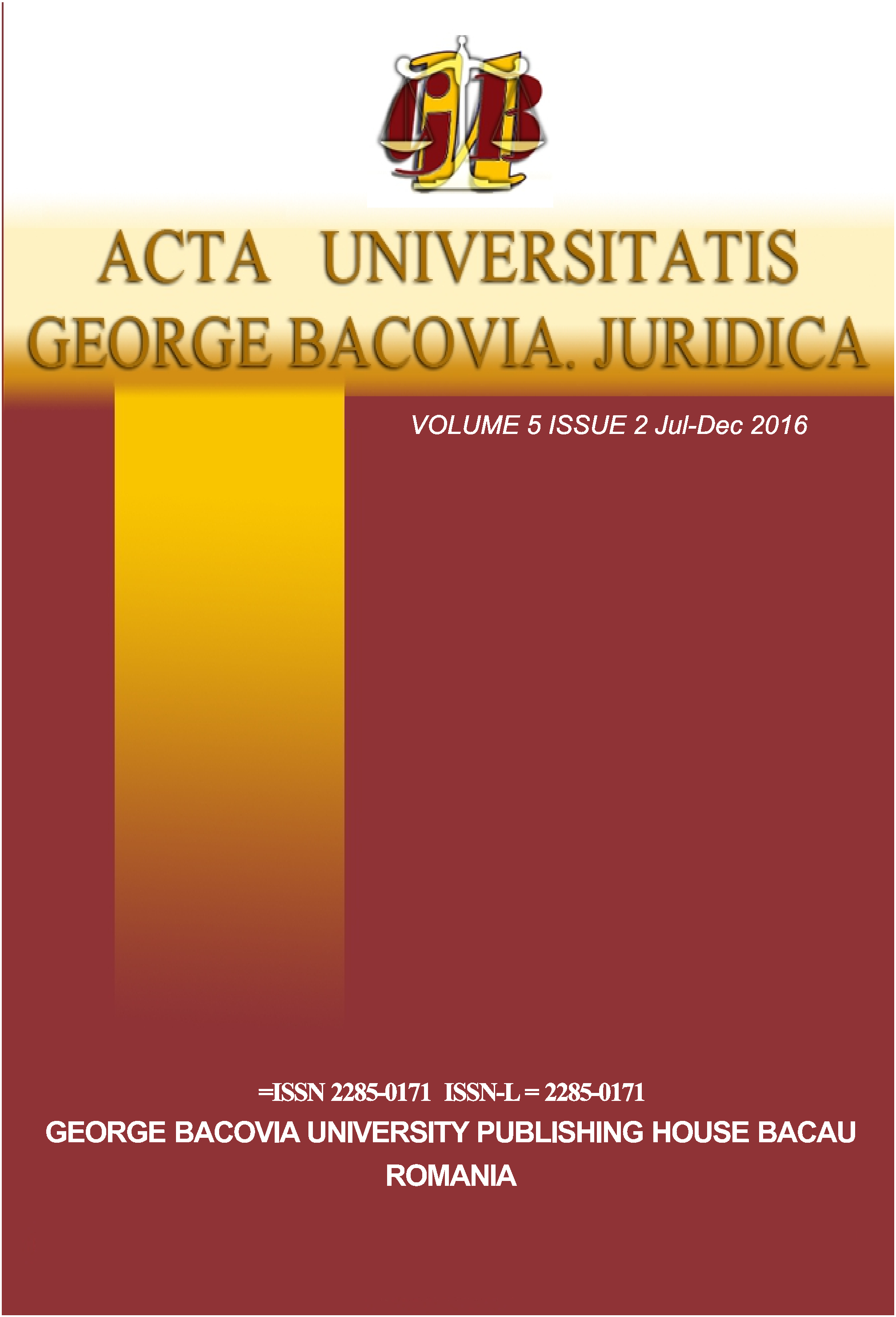Keywords: good faith; justice; equity; ethics; law; magistrate; moral principles; motivation;
Abiding by the law is a general obligation for any citizen. But when the magistrate has to abide by the law by applying and enforcing it upon others, Pandora box might be opening. Therefore, it is very important that magistrates do rely on good faith and strong knowledge of moral principles, together with epistemological knowledge, while being highly motivated by doing the right thing – and the right thing in our profession is justice – this comes as the main idea of ethics for magistrates. Ethics is a branch of philosophy, defined as a field of intellectual enquiry about what a person should do and should not do, involving concepts of right and wrong, virtue and vice, justice and crime. The term derives from the Ancient Greek word ,,ἦθος” (,,ethos”) which is an entity itself as the Greek language is terminological – and may be translated as ,,virtuous habit”. Ethics is also referred to as morality (from the later Latin „moralitas” – ,,manner, character, proper behavior”). „Although the morality of people and their ethics amounts to the same thing, there is a usage that restricts morality to systems such as that of Immanuel Kant, based on notions such as duty, obligation, and principles of conduct, reserving ethics for the more Aristotelian approach to practical reasoning, based on the notion of a virtue, and generally avoiding the separation of 'moral' considerations from other practical considerations” [Simon Blackburn, Oxford Dictionary of Philosophy (2nd ed.), 2008, p. 240].
More...


Keywords: estrangement; normality/abnormality; phenomenology; selfhood; schizophrenia.
Selfhood at the Fragile Border of (Ab)normality. We will attempt to briefly examine the phenomenological aspects of the ontic and ontological appearance of normal selfhood and psychopathological manifestations. Behind the psychological, anthropological or hermeneutical and cultural philosophical concepts relating selfhood one can discover the phenomenal character of the appearance of our identity within the domain of experience. Furthermore, towards the end of our study, we will employ specific phenomenological concepts, which we try to apply to different psychopathological manifestations. Our goal is to present a paradigm shift pertaining to the interpretation of abnormality and especially schizophrenia, which is made possible precisely by the phenomenological approach presented above.
More...
Keywords: Aristotle; democracy; oligarchy; dialectic; number; wealth; differentia; accident.
Dialectic and Its Role in Aristotle’s Political Morphology. The Case of Distinguishing Oligarchy and Democracy. Is the number of rulers an essential criterion in distinguishing democracy from oligarchy? This is an important issue tackled by Aristotle in two places from his Politics (III, 8 and IV, 4), an issue that seems to generate disagreement among scholars. Some believe that number is an essential criterion, i.e. a differentia, others that it is an accident. An attempt to solve this disagreement shall be considered from the perspective of Aristotle’s views on dialectics. I will try to show that even if there is no sufficient proof to mandate the interpretation that the number of rulers is a differentia, this position can be defended to some point. In addition, that it is more likely that he considered number to be a particular type of accident.
More...
Keywords: class; genealogy; Western political theory; property; poverty; capitalism.
This article discusses the Western modern prerequisites of class, namely, on the one side a presentation of the social forces and political conjectures that have lead to the formation of modern class. On the other a discussion of some of the elements of Modern political philosophy that have served as an apology or theoretical support to the asymmetric social structures determined by the revolution of the mode of production, namely the transition to capitalism. Modern class is the social expression of an abstraction that has the concrete historical determination of being abstract, such as it is built on the basis of abstract labor (the historically determinate feature of labor of being abstract). Our article has the objective of retracing the intricate relation between the origin of capitalism (the positing of its own condition of possibility and the real subjection of this conditions under the regulative idea of capital, of the law of value) and the social and philosophical movement of troupes that made possible the birth of capitalism, more precisely the co-determination of capital and class. The prolegomena of the concept of class can serve as means for a larger reflection on the nature of social composition and the dialectical relations that bind it to the mode of production.
More...
Keywords: meaning in life; haemodialysis; patient; quality of life; depression; coping behaviour.
Meaning in Life and Sources of Meaning, Depression and Quality of Life in Patients on Haemodialysis. Objectives: The study aims to emphasize the connections between meaning in life, sources of meaning profiles, depression and quality of life in patients on haemodialysis (HD), as well as the hierarchy of sources of meaning in life of HD patients. Material and methods: The research was conducted on 70 HD patients (M = 54.55 ± 11.70). The instruments used were the Meaning in Life Questionnaire, Sources of Meaning Profile-Revised, Short Form 36 Health Survey Questionnaire and Beck's Depression Inventory. The data were processed using SPSS 17.00. Results: Negative correlations were identified between depression and the following variables: quality of life (r = - 0.490, p < 0,001), physical health (r = - 0.373, p = 0.001) and mental health (r = - 0.531, p < 0.001); collectivism (r = - 0.296, p = 0.013). A positive correlation was identified between individualism and physical health (r = 0.337, p = 0.004). Satisfying one's daily needs, engaging in personal relationships and one's relationship with nature are the most representative sources of meaning in life of HD patients. The results emphasize that HD patients with a high level of depression have significantly lower quality of life (p = 0.009) compared to patients with low and moderate values of depression. Conclusion: The results of this research highlight the fact that low scores of depression increase quality of life in HD patients, while meaning in life, gender and the environment are not influential. Although specific to the subjects who were part of the research lot, the results obtained can enrich scientific literature and trace future research directions.
More...
Keywords: Accounting research; doctrinal research; normative research.
Doctrinal Research as a Means to Recover Normative Thinking in Accounting. The article debates whether legal doctrinal research could be applied in contemporary accounting research to bring back the prescriptive nature of normative research and whether, by applying doctrinal research, a new focus could be created in accounting research. The article found that the main difference between doctrinal research and traditional scientific and social research is that the focus of doctrinal research is not on the development of theories, but on the underlying doctrines, concepts, rules and principles on which practice and the practical system are based. A shift in accounting research from traditional research that creates theory to research that focuses on the underlying doctrines of the accounting discipline would create an insider perspective in accounting research, which could bring accounting research closer to accounting practice. Doctrinal research could bring normative and prescriptive aspects back to accounting research, but such normative aspects will not necessarily be similar to traditional normative research.
More...
Keywords: Business ethics; corporate culture; corporate social responsibility; corporate sustainability.
The Corporate Governance Conundrum: Perspectives from Dante’s Inferno. Corporate sustainability reporting, renowned as an instrument for businesses to communicate how they function more efficiently and responsibly within the social and physical environment, while simultaneously remaining profitable, has evolved in an up-and-coming trend by businesses. Recent corporate history saw much contrast in ethical behaviour in the global corporate environment. On the one hand, Dante’s deadly sin of avarice was running amok, which resulted in spectacular corporate demises. On the other hand, there was the rise of the concept of sustainable development, which describes an organisational culture change aiming to ensure that routine business decisions are made within an economically, socially and environmentally responsible framework. However, given the realities of the modern business environment, intangible ethical philosophies and lip-service codes of ethical conduct may often not be sufficient to ensure responsible and sustainable corporate, environmental and social development.This article reflects on how corporate sin potentially contributes to the contemporary corporate governance conundrum as well as on whether ethics codes can change ethical behaviour.
More...
Keywords: citizenship; nation; state; country; patriotism; European citizenship; constitutional law; European Union law
Romanian people, culture andnatin are inseparable processes, buildingpermanent and homeland symbols, flag,anthem, emblem, nationality, Carpathians,the Danube and the right part of Romanianculture. I was challenged to perform thisaction legal research related to the news ofthe death of close to Romanian citizenship and patriotism both in the national politicalstruggle and, especially, law, for severalreasons. First, what he had written yearsago about citizenship, during the formationof modern states, sovereign, as a form ofexistence of a nation, appears today in theage of globalization and Europeanization,outdated, anachronistic. A man, 61, as amI, who write these lines, thinks about hisown death more often than one, say, 30. Ido not think necessarily physical deathwhich the state and citizenship umbilicallink between citizens and the political formof social organization with legal cover, butthe spiritual joining the souls of men andvibrate when, honestly sung the nationalanthem.
More...
Keywords: President; Parliament; relations; semi-presidential republics
This paper is a comparativeanalysis of the relations between thePresident and Parliament in semipresidentialrepublics, such as France,Finland, Portugal, Austria and Ireland.Firstly, the specific features of a semipresidentialsystem are presented. Then, wefocus on the relations between the head ofstate and legislature, appearing as anecessity of control and collaborationbetween public authorities, which arefundamental requirements of the principleof the separation of powers. Thecooperation between the President and theParliament is expressed by means ofdifferent procedures: addressing messagesto Parliament, extending the President’smandate, convening and dissolvingParliament, promulgation of laws,collaboration on forming the Government,placing members of Government undercriminal prosecution, initiatingreferendum, constitutional revision,establishing exceptional measures,impeachment of the head of state for hightreason. The commented constitutionalprovisions show that in Finland, Portugal,Austria and Ireland, in the relationsbetween the President and Parliament, thelatter has a decisive role. The exception tothis is represented by France, where thePresident is "the cornerstone" of the entireinstitutional system, as he has importantattributions. The Parliament issubordinated to him, especially if the head of state has the support of theparliamentary majority in the NationalAssembly. The comparative analysis of therelation between President and Parliamentin the examined states can be useful to boththe constitutional legislator of theexamined states, in order to improve therelevant legislation in the analyzed fieldand to redefining, in practice, the relationsbetween the head of state and thelegislature.
More...
Keywords: international cooperation; Eurojust; recognition decision; Europol; national legislation
The emergence anddevelopment cooperation internationalhas been imposed on both events as wellas the positive and negative events, tryingin this way to find solutions to solve theproblems of the responsiveness of amember taken in isolation. In the currentstage of development of the contemporarysociety for international cooperationbetween sovereign states and equal inrights becomes so, a compelling reality,imposed by the objective needs. Theprinciple of cooperation is today widelyadmitted in international relationsbetween states, contributing to the mutualknowledge among nations. The premise ofthe fundamental in the development ofbilateral relations international must stillconstitute the principle of theindependence and national sovereignty.
More...
Keywords: legality; criminal trial; court; legislature; evidence; judicial proceedings; fair proceedings; the principle of loyalty; judge
Realization of the principleof loyalty enshrined in Article 101 CPC,involves fairly judging a person, done inpublic, within a reasonable term, by anindependent and impartial tribunalestablished by law in the determination ofany criminal charges brought thereto onthe correctly produced evidence. Thus, byprovisions of the new Criminal ProcedureCode, the legislature expressly providedboth the penalty of exclusion of evidence,but it had also explicitly made a specificprocedure for their invalidation andadditional procedural solutions underconditions where there are doubts abouthow the judicial body obtained suchevidence.
More...
Keywords: self-defense; conditions; attack; unjust; legal basis
This paper follows a thoroughanalysis of the unjust character of theattack; this approach is one that involvesall legal layers: legislation, doctrine andjurisprudence. At the onset, an attempt hasbeen made to establish the notion of "lackof legal basis", as accurately as possible,afterwards the study continues with thequestion of admissibility or inadmissibilityof the status of self-defense in cases ofbrawl or connected to the mental ability ofthe attacker, to finally pay attention to thedelicate and controversial issue of whetheragainst an unjust attack from a publicofficial one can act in self-defense. Thelegislation under consideration is theRomanian one with its new criminal codes;yet, for a wider and clearer perspective onhow the issues are addressed thecomparative method is used too, andsimilar provisions in the Criminal Code orthe European Convention on HumanRights are analyzed, too; the position of theEuropean Court of Human Rights occupiesa central place in our argumentation.
More...
Keywords: nvironment protection; criminal liability; organized crime; environmental crime
Criminal liability acquired inenvironmental law, a primordial place inthe hierarchy of legal liability titpurilor,amidst a growing number of negative factsagainst the environment. The new CriminalCode contributes to punish acts against theenvironment. Another aspect analyzed inthis paper refers to the phenomenon oforganized crime booming. Against thisbackground were amplified and destructiveactions against the environment, which ledto the ecological crime. In Europe andglobally are important steps towards amore rigorous control of crime. The workcaptures the situation of Romania andFrance in terms of concerns for stoppingcrime in ecology.
More...
Keywords: special procedure; defendant; defender; prosecutor; court
Enacted as a specialprocedure to ensure the celerity ofcriminal proceedings, to restore theconfidence of consumers in the act ofjustice and to contribute to reduce thecosts of criminal cases falling under theconditions of substance and form of thisinstitution, the plea agreement has afundamental role in ensuring thesimplification of the first two phases ofthe process - the prosecution and trial.This paper is a review of the provisions inforce concerning the addressed institution(taking into account the latest changesoperated through the EmergencyGovernment's Ordinance 18/2016), whichpresents the appreciated doctrinalopinions as essential in connection withthe subject matter, content, holders,negotiation itself and the procedures infront of the Court. We did not omit theaspects of comparative law on the matterbut also we presented solutions fromnational judicial practice relating to waysfor the examination and settlement of theincident causes.
More...